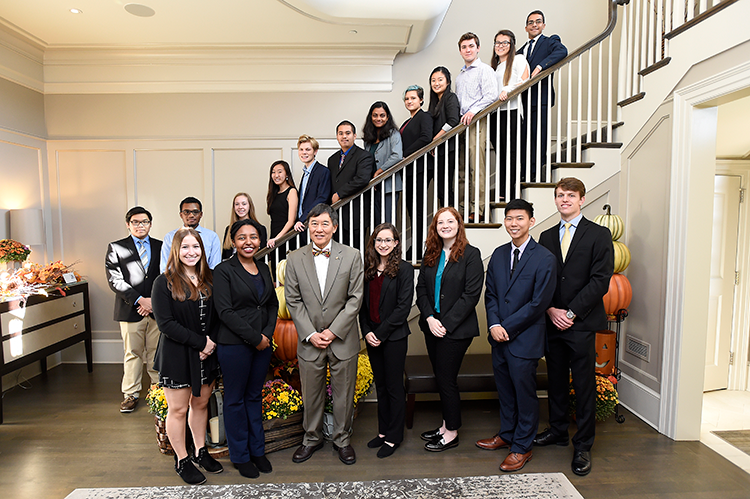Paying It Forward
Early on in the COVID-19 pandemic, the University of Maryland’s A. James Clark Scholars Program received an email from Natalie Grandison, director of engineering initiatives at the A. James & Alice B. Clark Foundation, with an ask: At a time when Clark Scholars are looking for ways to help, how can the Clark Foundation serve as a conduit? “The Foundation was looking to make an impact, both at the community level and with their scholars,” says Elizabeth Galvin, program manager for UMD’s Clark Foundation Scholarship Programs. “It was designed as an opportunity for the cohort to connect and collaborate on something good for their community during a time when they are forced to be apart.” Dubbed the Clark Scholars Program COVID-19 Philanthropy Challenge, it was a terrific opportunity for UMD’s 19 Clark Scholars—all accomplished undergraduate students at the A. James Clark School of Engineering—to harness the might of a foundation in support of a worthy organization steadfast in the fight against COVID. It was one scholar in particular who recognized that this funding could pull double-duty by supporting a program that is mobilizing a response to COVID by nurturing the potential of future engineers. “It’s a funny thing, but I just had the benefit of this great experience and knew [the Clark Scholars Philanthropy Challenge] was a chance to create the same opportunity for others like me,” says Emily Cho, a junior mechanical engineering student and inaugural member of UMD’s Clark Scholars. “It just seemed like the perfect fit.” That opportunity was the COVID-19 Call for Engineering Action, an international appeal from the National Academy of Engineering (NAE) Grand Challenges Scholars Program (GCSP). A “mechanism to bring together people with great ideas,” the initiative invites engineering students from all over the world to join a collaborative knowledge-sharing network with industry leaders, GCSP alumni, and national agencies to formulate solutions to the major challenges of COVID: security, quality of life, health and medicine, and sustainability and recovery. The program matches those with ideas with people who have aligning expertise; it nurtures teams through mentorship, resources, and in-depth training; and it provides outreach activities for students, including budding engineers still in high school. “Mr. Clark believed that engineers can solve the world’s problems, and in his legacy we are pleased to see two of the Clark Foundation’s grantees—the University of Maryland Clark Scholars Program and the National Academy of Engineering—work in partnership to address the challenges of the COVID-19 pandemic,” says Foundation President and CEO Joe Del Guercio. Cho had learned about the NAE’s COVID-19 Call for Action from one of the organizers of the initiative, whom she met last fall at the Grand Challenges Global Summit, a biannual event sponsored by the NAE, the Royal National Academy of Engineering, and the Chinese Academy of Engineering. As Cho learned more about objectives surrounding student mentorship and K-12 programming, it called to mind a conversation she had a year earlier at a Clark Scholars dinner. “Someone from the Foundation had mentioned their interest in supporting K-12 programs,” says Cho, “and here was this great program that is providing advice and mentorship for students in high school. It went beyond funding this important initiative targeting COVID, because it gave us the chance to provide opportunity to other students, as well.” The Clark Scholars Program is a four-year need-based scholarship offered at 11 of the nation’s top engineering schools, including UMD’s Clark School. UMD’s program adds 10 of the most promising incoming freshmen a year to join a cohort and engage in an annual service learning project, seminars and events, and a curated curriculum—including business coursework, a nod to Clark School alumnus and eponym Jim Clark (’50 civil engineering) and his belief that engineering and business education should go hand-in-hand. Maryland’s are the only Clark Scholars to also be NAE Grand Challenges Scholars. The dual appointment is rigorous but awash with opportunity, such as last fall’s summit, where Cho was matched with peers from around the world to develop a device that tracks human health outside of a hospital setting, making the finals of the summit’s hackathon competition. “It was an incredible experience for me,” says Cho. “I had the opportunity to meet and work with an amazing group of students from around the world who are incredibly driven and motivated to solve these global issues. It was a once-in-a-lifetime opportunity that I was afforded by being part of the Clark Scholars Program.” Obtaining a consensus from the other Clark Scholars to propose the NAE COVID-19 Call for Action was an easy sell. The grant from the Clark Foundation assisted the initiative by funding the guidance and goal-setting needed to get COVID-19 Call for Action teams to “demo day,” a chance to present their grand ideas in front of a committee of top experts from industry and academia. Those teams were in good company; Cho and her team from the Grand Challenges Summit were also invited to present their device to the COVID-19 Call for Action committee in June. “Emily is a real go-getter,” says Galvin. “She is passionate and fearless in her pursuit. But what’s special to me about Emily is she also recognizes the role opportunity plays in that success. She’s thinking critically about how to support other students and took the initiative to pay that forward.”
Related Articles: October 7, 2020 Prev Next |
|


